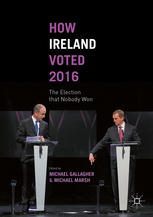

Most ebook files are in PDF format, so you can easily read them using various software such as Foxit Reader or directly on the Google Chrome browser.
Some ebook files are released by publishers in other formats such as .awz, .mobi, .epub, .fb2, etc. You may need to install specific software to read these formats on mobile/PC, such as Calibre.
Please read the tutorial at this link. https://ebooknice.com/page/post?id=faq
We offer FREE conversion to the popular formats you request; however, this may take some time. Therefore, right after payment, please email us, and we will try to provide the service as quickly as possible.
For some exceptional file formats or broken links (if any), please refrain from opening any disputes. Instead, email us first, and we will try to assist within a maximum of 6 hours.
EbookNice Team

Status:
Available4.5
36 reviewsThis book is the definitive analysis of the 2016 Irish general election and is the eighth book in the well-established How Ireland Voted series. The 2011 election in Ireland was characterised as an earthquake, but the aftershocks visible in the 2016 election were equally dramatic. This election saw the rout of the government that had presided over a remarkable economic recovery, and marked a new low for the strength of the traditional party system, as smaller parties and independents attracted almost half of all votes. The first chapter sets the context, and later ones investigate the extent to which the outgoing government fulfilled its 2011 pledges, and how candidates were selected. The success or otherwise of campaign strategies is assessed, the results and the behaviour of voters are analysed, and the aftermath, when it took a record length of time to form a government, is explored. Other chapters examine the consequence of new gender quotas for candidate selection, consider the reasons for the unusual success of independents, and reflect on the implications. The book also reveals intriguing insights into the candidates’ experiences of the election, both successful and unsuccessful. It will be of use to students, teachers and scholars of Irish politics, as well as the wider reader interested in Irish politics and elections.